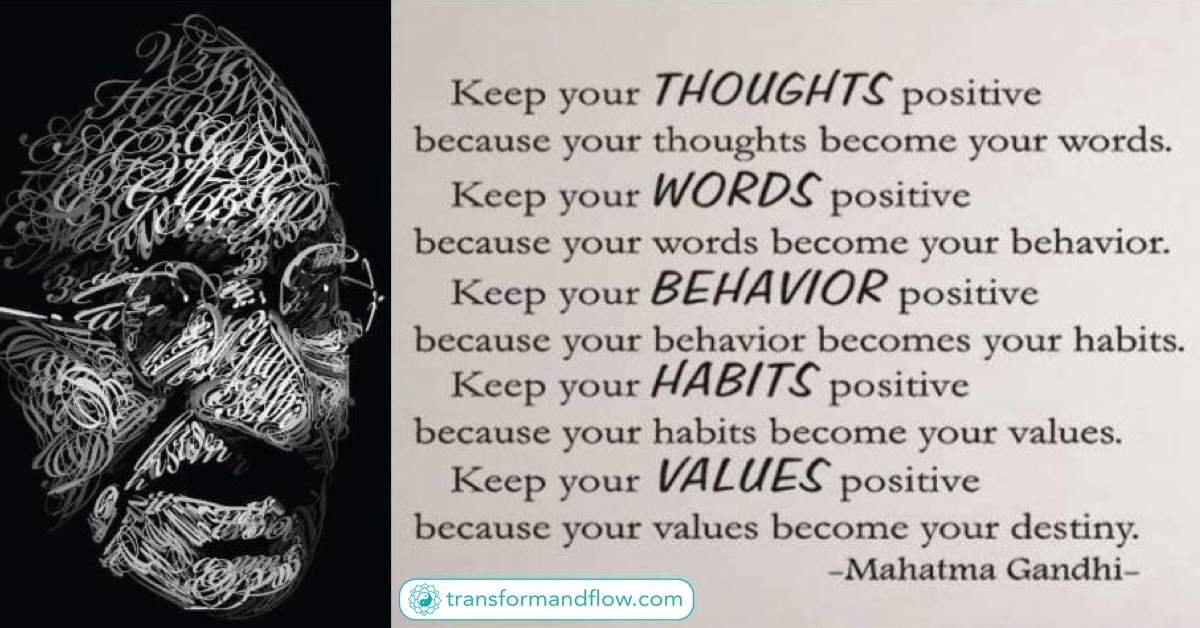Keep your THOUGHTS positive, because your thoughts become your words.
Keep your WORDS positive, because your words become your behavior.
Keep your BEHAVIOR positive, because your behavior becomes your habits.
Keep your HABITS positive, because your habits become your values.
Keep your VALUES positive, because your values become your destiny.
Mahatma Gandhi
Mahatma Gandhi’s profound insight, “Keep your thoughts positive, because your thoughts become your words. Keep your words positive, because your words become your behavior. Keep your behavior positive, because your behavior becomes your habits. Keep your habits positive, because your habits become your values. Keep your values positive, because your values become your destiny,” underscores the transformative power of mindfulness in shaping our lives. This quote encapsulates the cascading effect of our internal states on our external realities, highlighting the importance of cultivating positivity at every stage.
The Power of Positive Thoughts
Our thoughts are the seeds from which our realities sprout. They influence our perceptions, decisions, and ultimately, our destinies. By maintaining a positive mental framework, we set the stage for constructive words and actions. As Norman Vincent Peale discusses in “The Power of Positive Thinking,” fostering a positive mindset can lead to improved problem-solving and a more fulfilling life.
Words as Reflections of Thought
Words are the audible expressions of our thoughts. They have the power to inspire, heal, or harm. By consciously choosing positive language, we not only uplift others but also reinforce our own positive thinking. This practice fosters an environment of encouragement and growth, both internally and externally.
Behavior: The Manifestation of Words
Our behaviors are direct manifestations of our spoken words and internal thoughts. Consistently expressing positive words leads to actions that align with those sentiments. For instance, offering words of kindness often translates into acts of compassion. This alignment between words and actions builds integrity and trustworthiness.
Habits: The Repetition of Behavior
Repeated behaviors solidify into habits. When we consistently engage in positive actions, they become second nature. These habits shape our daily routines and influence our long-term trajectories. As highlighted in educational resources, developing positive habits is crucial for personal growth and success.
Values: The Core of Our Being
Habits, over time, crystallize into values—the core principles that guide our decisions and actions. Positive habits foster values such as integrity, empathy, and perseverance. These values serve as internal compasses, directing us toward meaningful and purposeful lives.
Destiny: The Culmination of Values
Our values ultimately shape our destinies. They influence the paths we choose and the impact we have on the world. By nurturing positive values, we steer our lives toward fulfilling and impactful outcomes. This journey from thought to destiny underscores the profound interconnectedness of our internal states and external realities.
Mindfulness: The Tool for Cultivating Positivity
Mindfulness—the practice of being present and fully engaged in the current moment—is a powerful tool for fostering positivity at each stage of this progression. By cultivating awareness, we can observe and guide our thoughts, words, behaviors, and habits, ensuring they align with our desired values and destinies. Engaging in regular mindfulness practices, such as meditation or reflective journaling, can enhance this awareness and promote a positive life trajectory.
Practical Steps to Implement Mindfulness and Positivity
1. Mindful Meditation
Dedicate time each day to sit quietly and observe your thoughts without judgment. This practice enhances self-awareness and helps in identifying negative thought patterns.
2. Positive Affirmations
Incorporate daily affirmations that reinforce positive beliefs and attitudes. Repeating affirmations can rewire neural pathways, promoting a positive mindset.
3. Conscious Communication
Before speaking, pause to consider the impact of your words. Aim to use language that uplifts and encourages others.
4. Reflective Journaling
At the end of each day, reflect on your actions and behaviors. Acknowledge areas where you demonstrated positivity and identify opportunities for growth.
5. Habit Stacking
Attach new positive habits to existing routines. For example, practice gratitude immediately after brushing your teeth in the morning.
6. Value Clarification
Regularly assess and define your core values. Engage in activities and make choices that align with these principles.
7. Seek Positive Influences
Surround yourself with individuals and environments that foster positivity and growth. Engage in communities that support your mindfulness journey and mindful techniques that resonate with you.
By integrating these practices into daily life, we can harness the wisdom of Gandhi’s words, steering our thoughts, words, behaviors, habits, and values toward a destiny of fulfillment and purpose.
How Your Thinking Creates Your Reality. Jennice Vilhauer, Ph.D – Phycology Today
Stanford researchers explore how the human mind shapes reality. Nathan Collins – Stanford Report


